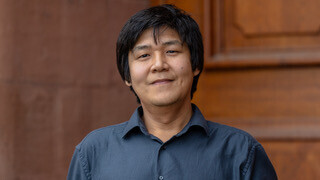Interview with Prof Dr Nan Zhang, Chair of Evidence-based Policy Research

‘Why did you decide in favour of the University of Mannheim?’
I think it was mainly unexpected opportunities and luck that played a role. It all started when my wife started doing her post-doc here in Mannheim a few years ago. At the same time, I received one of the big scholarships from the German Research Foundation. It left me no choice of association at an institute. In the end, I chose the Mannheim Centre for Social Research at the University of Mannheim because my wife also works here. Last year, I was lucky enough to be offered a professorship here.
‘What is your current research focus?’
I have written several publications on classical topics such as state building and state development, increasingly incorporating historical data. However, my current research focus is on the study of group relations, language and identity, social norms and civic behaviour. Key areas of application include the study of immigration, ethnic diversity and state and nation building. One example is my current research project, which is funded by the John F. Kennedy Foundation. It deals with ethnic diversity and co-operation. I was inspired by my own experiences as a two-time immigrant. People often ask me where I come from. My answer is: ‘I'm from California.’ This is not enough for some people and they often follow up with, ‘Where are you really from?’ A question that relates to my ancestors. These experiences make me think about how people would behave if I were German. These reflections were the impetus for a series of field experiments, which form the main part of my current research.
‘What subjects did you study?’
I come from the USA. That's why I spent my entire degree there. I completed my Bachelor's degree in Berkeley and majored in economics and political science. At the request of my parents, who hoped that I would study medicine or law as a good Asian son, I started studying law at Stanford University. After the first day, however, I knew that law was not my passion. Fortunately, I had the opportunity to do a doctorate in political science and a law degree at the same time as part of a combined study programme. I then worked in research for several years. I studied behavioural economics and sociology. But my passion is political science. So I left law behind me. But at least I have a nice certificate.
‘What is the biggest difference between the University of Mannheim and your professional stations so far?’
Before I came to the University of Mannheim, I worked at the Max Planck Institute for Research on Collective Goods in Bonn. It's a pure research institute. You live in a villa and have no contact with students. We were a team of around 30 to 40 people who worked together on various research projects. Every week we had a kind of institute meeting, similar to a seminar, where we regularly exchanged ideas. One major difference is that we didn't have to teach at the MPI.
At the University of Mannheim, on the other hand, teaching is an integral part of our work. It makes me happy to see how students learn and develop. However, teaching requires a considerable amount of time, which has to be spent alongside our own research. Research is essential in order to obtain scholarships or promotions. I am convinced that the real challenge is to combine teaching and research effectively.
One of the ideas I have for next term is for the political science students to do a kind of practical tutorial. We design and conduct a joint research project. We collect data and analyse it. And at the end, we write a paper in which everyone is involved as authors.
‘Who was your favourite band or singer?’
Maybe it's because I studied at Berkeley and UC Berkeley is quite a hippie town. But my favourite singer is actually Bob Dylan. Funnily enough, I like Bob Dylan because he can't sing, at least I don't think the young Bob Dylan could. Nevertheless, he was a great musician. I play a few instruments myself and I can't sing either.
‘Which famous person would you like to go to the canteen with and why?’
This is the question I struggled with the most. I have to admit that I haven't been to a canteen of any kind for 20 years. I'm a ‘snob’ when it comes to food. For a good conversation, it would be interesting to just have a cool chef like Yotam Ottolenghi or Anthony Bourdain at the table. We could think about life and just see what happens. Maybe the canteen here is very good, so they come along.